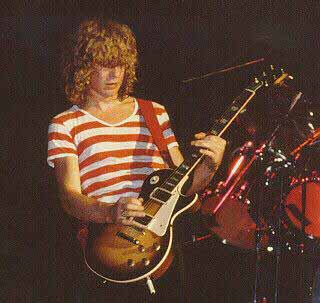|
|
|
Def Leppard are back. I don't know how that reads in
the U.S., but on this side of the pond they've just exploded back into action, hitting a
level of success they can only have dreamed about-and maybe even had a few nightmares
about as well! They've made an impressive start to the job of regaining some space, some
airplay, and some album sales; Hysteria went up the U.K. album charts so fast it left
scorch marks, and they've pulled two hit singles off it as well, which means air-time on
national radio, as well as valuable TV exposure. Remember, folks, Def Leppard hail from a
country that doesn't have MTV! Can you believe that? To be a rock band and have a hit
single used to be as likely as seeing Michael Jackson queuing at the local McDonald's for
a take-out, easy on the onions-feasible, but a less than common occurrence right? But the
Leps have done it. In fact, they've done it one better by scoring two hits at the same
time.
Which seems a good place to start with Steve Clark and Phil Collen as we settle down backstage at one of the last few gigs on the British leg of Def Leppard's 18 month "We're Back/World Takeover" tour. This is the truth about where Def Leppard have been, are going, and more.
So Steve, about those hit singles-Def Leppard with hit singles!!
"Well, it's what we always wanted," Steve says with the kind of smile a musician uses when years of slog and struggle have finally paid off in their home country. "We did wonder why 'Photograph' wasn't a hit at the time. Maybe it would be if we put it out again; who knows?"
"At least people know who the band is now," Phil continues. "We are individuals, not five poodles!"
No argument there, although you could hardly blame people for finding their recollections of Def Leppard a little hazy. They've hardly been what you could call "high profile" over the last few years!
But that's all changed now, with the new album, the hit singles, and the start of a massive world tour that's going to see Leppard working on the road throughout 1988, making up some of that lost ground. It seemed entirely appropriate for the band to start their resurgence in their home country-in fact, they began the tour proper in Sheffield, their hometown. So, does it feel odd to be playing in England again?
"Very good, indeed," decides Steve, nodding vigorously. "It does feel very strange to be bumping into people you haven't seen for quite a few years. We appeared on TV a couple of times, and the phones at our parents' homes never stopped ringing!"
"It is good to be back, but it will be nice to get going and concentrate on playing live again," Phil agrees. "The biggest problem about playing in Sheffield is seeing to relatives and friends, worrying about whether Auntie Mabel has a backstage pass or not, that kind of thing. We actually started the tour with a couple of gigs in Ireland, but since we've been living there for a large part of the last four years, it still hasn't really sunk in that we are actually back on the road."
One of the problems of taking such a long sabbatical
is that people have plenty of chances to load up the missiles of cynicism that always seem
to start flying when the warm glow of success has cooled off. But, just to set the record
straight, the money hasn't been frittered away on the sort of luxuries that some top notch
rock bands aspire to - cars and houses and so on. Nope, the Leps found something far more
exotic to make a hole in their collective bank balance with. They spent the money on...
studio time! What ... all of it?
"No, not quite," smiles Steve Clark ruefully. "But far more than I think people realize. Yes, we did make a lot of money out of Pyromania, but we didn't really get any time to spend it! We were in the middle of a tour when the album took off, and more or less as soon as we finished, we were working on the next album. Yes, people did have odd weeks off here and there, but I can honestly say that in the entire four years, someone has been working in the studio more or less every day, and when you add up the cost of hiring a studio for that long.
"I always said that when we earned 'x' amount of money, I'd have this house and that car, but living abroad the way we have done, with no permanent base, makes it all meaningless," says Steve. "It's just a pain trying to look after things when we're moving around. In the end, I just wiped the slate clean and got rid of them. I haven't even got a house now. I've got an apartment in Paris and I've bought an apartment in New York which I haven't even seen yet, much less lived in. There just hasn't been the time. As Phil said, we've been so busy working."
It sounds like the height of frustration, to have worked for all the material benefits that success brings, only to find that there's not so much money, and even less time, than everyone thought. It's not how Steve Clark sees it.
"No, I didn't get into this band to make a lot of money. I wanted to play music front of as many people as I could. I' not denying that success and fame and money have been a result, and I wouldn’t dream of turning any of it down, but there's plenty of time to enjoy all that later on in life, when the pressure is off. Like Phil says, I bought a really nice car with the first money we got, and it spent all its time gathering dust in a warehouse England. I was paying out to keep it insured, and never having the time to enjoy it, so I got rid of it. Things like that don't matter as much as you think they do when you've not had them."
Pressure is not a word that comes to mind when you think of life in a top-flight rock band with the sort of sales that Pyromania generated, but ponder for a moment the awesome task of trying to follow it, and the sort of doubts that must start to creep in - especially when work on the new project isn't quite as smooth and easy as the band would like. It's a feeling that can get out of control very quickly if you let it. Def Leppard didn't, as Steve explains: "It wasn't so much a feeling of whether we could make a better album; I'm not sure that's the way to approach it. What we wanted was an album that sounded how we wanted it to sound. That's why we spent so long over it, not because, as so many people want to believe, we were too idle to get on with the work. In fact it's the opposite, as I've said; one or other of the band was working in the studio for almost the entire time between the two albums."
Part of the criticism from British fans was that Pyromania was an album aimed fairly and squarely at American radio audiences, which is the sensible way to market an album in a country too vast to comprehensively cover by any other method. But whatever the reason, British metal freaks grumbled that all the bumps and edges had been smoothed out, mainly at the hands of producer Mutt Lange.
"So what?" is Phil's not entirely
unreasonable response to that attitude. "What we had there was the sound that Mutt
Lange produces. It's the way he works, and we found we liked to work that way. And as
sales of Pyromania have shown, including Britain, the sound has been successful for us.
Yes, there are people who complain about us releasing singles that succeed in the pop
chants, but that's what it's about; getting the music through o as many people as we can.
That's what Del Leppard are about."
The proven formula of Mutt Lange's production made him the obvious choice for producer of the famous follow-up album, but at the time the sessions got under way, Mr. Lange was committed elsewhere. Enter Jim Steinman, of the phenomenal Meatloaf epic Bat Out of Hell, and producer of some note as well, thank you. Of course, with 20/20 hindsight, the critics can once again dip their pens in poison and say it was a marriage doomed from the start. Back then, it was a case of the band having enough guts to face up to the lack of cohesive progress, and dump over four months' recording in the trash.
"People have said it was a brave move," remembers Steve Clark. "I just think we should have done it earlier than we did. The fact is, we felt we were already behind schedule , Mutt wasn’t available, Jim Steinman was, so we gave it a try. We discovered that Jim works a different way than Mutt, and in a way that wasn't compatible with our style. To be brutally honest, his standards are just not as high; he's a more laid-back kind of guy, whereas Mutt is always pushing to get the best out of the acts he work with. So we carried on and decided we’d wait until the vocals and see what happened then, and it was at that time that we realized it just wasn't sounding how we wanted it. So we decided that it would be best to part company with Jim and start over."
And the time goes on. If it's pressure time for the band, imagine what must be going through corporate minds at the record company. Behind closed doors certain amount of trepidation was setting in - maybe the cast-iron certainty that everyone figured the new Leppard album to be was going to mutate into a gigantic money-guzzling monster that ate up the entire budget for the label.
"Oh man, they've been brilliant, real patient," Phil is happy to report. "They didn't say a word about all the time it were taking, although I'm sure the success Pyromania helped-that took time I record as well, so they must have decided to leave it to us. They must have wondered what we were doing, but they never pestered us for results. It's a good thing, too. We could never work properly with executives coming in and standing there saying 'Let's hear what you've got, then,' and us saying 'Well, of course, it'll sound much better with the vocals on. ' So they decided to wait until we gave them the finished product. They seem happy enough with it."
Understatement! Of course the company is happy with it- the album has lived up to all expectations and more. Making music is not a competition, but selling records is, and Hysteria is shifting mega-units.
"I firmly believe that if your music is the best that you can do, it will stand up," is Steve Clark's assessment of Def Leppard's piece of the action. "I reckon the biggest competition in America will be from Bad, but I'm not going to stick my neck out and say that's all we'll be up against. We'll just have to wait and see how it goes."
"This is our most successful year so far," Phil continues. "We honestly don't know why the album has taken off so quickly, or why we're having hit singles now, when we didn't have them before. If there is a reason, we've never figured out what it is. We've had some bad times during the making of this album - I don't have to go into details, everyone knows how it's been for the band. But when it's all finished, just the good times seem to shine through. We've all had a lot of faith in this album; we feel it's the best work we've ever done. We did wonder if people would remember us, people who bought pyromania are probably married with kids by now, but with this new album we seem to have picked up on a whole new generation of fans."
Among the new generation, in Britain at least, is a section of young ladies who've been turned on to the modern rock syndrome because of the pin-up appeal of bands like Bon Jovi. As metal styles continue to fragment (thrash, death, speed, crossover, et al.) the Leps are even being seen as a (gulp!) pop group! What do you say to that boys?
"Are we really?" wonders Steve Clark. "It's weird for us to imagine, but we've been away from Britain for so long, things have obviously changed in that time. That's really interesting."
What about you, Phil?
"It's the people who buy the record who decide what, if anything, they want to make us. If we need to be called a 'pop' band to get on national television and to have singles in the national charts, then we can be a pop band. I'll do it, who cares?"
Is being in Def Leppard still fun, Steve? "Oh yeah. As I said earlier, the whole point of getting into Def Leppard, for me anyway, was to play live in front of as many people as possible. The recording of this album was a bit of a downer because we had to spend so much time in the studio. Part of the delay was due to lack of time to write material, but we're determined not to get caught in that trap again-we've already started writing for the next album, so once the tour has finished, we can get into the studio and get it started."
But that's many months and a world tour away! Don't fret, fans, you won't be reduced to buying endless single cuts from Hysteria with the only variation being the design on the sleeve. Def Leppard have planned ahead for the lean times (vinyl-wise) while they take their smasheroonie album to a waiting world. What's the plan, Phil?
"Well, once we'd finished the recording of Hysteria we did seven songs straight off as a live band in a one-take situation, just to prove to ourselves that we could still do it, and they'll be surfacing as B-sides for the singles, which will be a much better value for the fans. We were going to have some material left over, but we decided to fit it all onto the album and make it a good solid album, 12 songs, over an hour of music. The fans have been waiting for it and we wanted it to be worth their time."
The wait is finally over: Def Leppard have emerged from the most harrowing period of just about any band's lifetime, but the result is a red-hot platter and a band who are stronger as individuals, and as a unit.
"We've learned such a lot," Phil decides. "Not so much musically, but as people, and we've come through the kind of problems that would have meant the end for most bands."
And just in case there are any lingering cynics out there who think you're only in it for the fun of it: could you stop tomorrow?
"Financially? No, we're working musicians like so many others," confirms Phil. "We spent so much money recording, and it was our money that got spent, don't let's lose sight of that. Then there's the cost of the production for this tour, which is a mint. But don't get me wrong, we're not complaining. As Steve has said, it's about working and playing live and being musicians in a band. That's what it's always been about. The music is what matters."